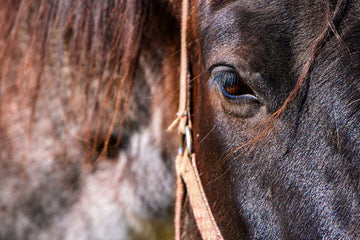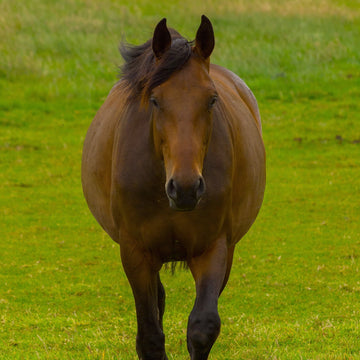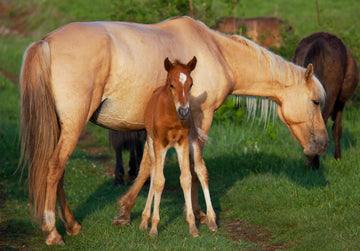When a horse is thin, with a body condition score below the desirable level, several factors need to be evaluated.
Ensure the Horse is Healthy
Certain health issues can make weight gain challenging, even under optimal conditions.
-
A veterinarian should examine the horse's teeth to check for abnormalities that may cause pain, making chewing and grinding feed uncomfortable and limiting food intake.
-
A fecal egg count will help determine if there is a significant parasite load in the gastrointestinal tract, consuming nutrients essential for the horse.
-
An endoscopic exam of the stomach can reveal gastric ulcers, a condition with high prevalence in sport horses.
Nutrition
Forage Quality
Providing high-quality forage is often the first factor to consider for underweight horses. Assessing the provided forage is crucial to understand its nutritional value and decide whether it should be replaced with a better alternative.
If good-quality pasture is available, placing the horse on excellent grazing remains a great strategy for weight gain. However, transitioning a horse to quality pasture should be done gradually.
If high-quality pasture is unavailable, grass hay can be supplemented with early-cut legume hay, which typically contains more energy than even high-quality grass hay. High-quality hay should ideally be available ad libitum to maintain a healthy gastrointestinal tract.
Recommended Product:
ALFALFA INTACOL
Choose a High-Energy Concentrate Feed
To help a horse gain weight, select a high-energy concentrate feed that provides energy from starch, fat, and fermentable fiber. Ensuring a complete vitamin and mineral profile is also essential.
-
For high-performance sport horses, use feeds tailored for competition.
Recommended Products:
PALATIN
POWER UP
-
For senior horses with dental challenges, prioritize a mash-style feed enriched with flaxseed oil.
Recommended Product:
NATURE MASH
-
For young horses, provide feed specifically designed for growing equines, feeding according to their needs while avoiding excessive energy intake, as overfeeding can lead to growth-related issues.
Recommended Product:
YOUNG
-
For pregnant mares, switch to a different feed during the last trimester of pregnancy and throughout lactation to meet increased nutritional demands.
Recommended Product:
EPOLDRIN
Supplementation
High-calorie supplements can be added to concentrate feed to increase energy density. For example:
-
Corn oil provides energy but is high in omega-6 fatty acids, especially when combined with a grain-rich diet.
-
Flaxseed oil and fish oil are better alternatives, as they are rich in omega-3 fatty acids and support caloric needs effectively.
In some cases, a digestive supplement may be beneficial. These supplements often include buffering agents to reduce gastric acidity and probiotics/prebiotics to support gut microbiota and improve digestive efficiency.
Recommended Product:
GASTROBALANCE
Be Patient
The effects of dietary management for weight gain and improved body condition take time and do not happen immediately. Focus on consistency rather than instant results.
By maintaining a proper diet, monitoring health, and addressing specific needs, the horse’s condition can gradually improve, ensuring long-term well-being.


